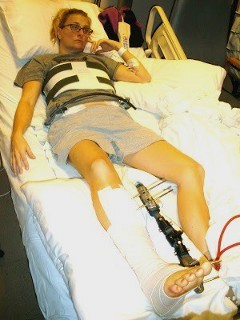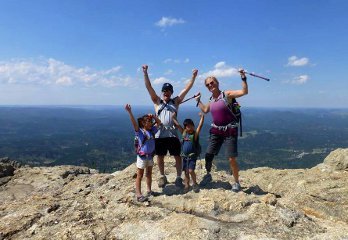Chris' Story
On November 30th, 2011, after an intense morning of working with my son and his autism therapy team, I decided to go into our local climbing gym, with my 4 year old son in-tow. I was a typical stressed-out mom…spinning in lots of directions, trying to manage child and self-care, and climbing was one of my ways of de-stressing and being active. I remember walking into the gym and saying to the guy behind the desk: “Alex, I’m gonna do some speed climbing today…I have a lot to do today.” There was a new route that I saw, and after checking to be sure my kiddo was doing okay, I set out to climb it….not realizing that I had forgotten to clip into the auto-belay system. About 30 feet up, I lunged to reach a hold and fell straight down, sending the forces through my ankle, pelvis, and back. I remember clearly, laying on the floor lamenting how I could not believe I had made such a dire mistake and how stressed out I was, while we waited for the ambulance to arrive. 
Through the haze of dilaudid, things finally started to sink in…as I watched the medical team cut off my clothing and saw the collection of x-rays and CT scans. The upshot: Vertical shear pelvic fracture requiring fixation and fusion of my SI joint, tibial plafond ankle fracture requiring fixation and multiple surgeries, L1, L4 and L5 fractures, and a rib fracture. I spent that winter in-and-out of the hospital with healing complications necessitating a tissue-transfer on my leg, and the next two years undergoing an additional 10 limb-salvage surgeries. On January 9th, 2014, I made the decision to have a below-the-knee amputation to regain my quality of life as an active person, and have been adjusting to the “new normal” as an amputee.
These years of healing have been a profound learning experience, and my background in working in mental health as a social worker gave me an interesting “insider” perspective from the vantage point of being a patient…..acutely aware of the potential for severe depression. Emotionally, for me, recovering was very difficult. I remember about four months into my recovery, in the thick of a lot of pain and lamenting to my husband: “If this is how it is always going to be, I don’t know if I want to be here…if there is no end in sight, how can I keep going?” The accomplishment of surviving and making it through an arduous recovery experience is something I’m prouder of than anything I have ever done. The learnings and intentions that have come out of my recovering experience are three-fold. I have realized….
- We need each other. We cannot get better while being alone with our thoughts (in fact, being alone with our thoughts, pain and disability is a sure recipe for depression.) We need folks who have “walked the walk”, so-to-speak, as encouragers while we move ahead in our new normal lives. The power of pain and disability to usurp one’s life-energy, determination, and will cannot be overstated. It needs to be met head-on with a warrior-like spirit and kindred souls on the recovering journey.
- Our bodies are meant to move. We feel and heal better if we remain active. This is particularly challenging when faced with pain and disability, which is why it is hugely important for medical institutions and other organizations to implement programs targeted toward helping persons recovering from injuries (and newly acquired disability) remain active in whatever ways we are able. We need to feel “normal” along with other folks facing physical challenges…as we gain strength, connect and learn how to enjoy being active in a new way.
- The concept of “trauma” can be seen as an invitation to live a life which is more holistic, less hurried, and more connected. As I look back on my accident, I am acutely aware of the fact that I was: 1) Distracted and in a hurry, 2) stressed, and 3) goal-driven. This is NOT unlike the majority of the population in America, and I have used it as a “wake up call” to the things in life that are important. It has helped me to take a look at who I am and what I can bring to help those around me to regain hope, meaning and purpose. I realize that slowing down and deep connection are challenging in the reality of our world today, but I think both are super-important and something to strive for.
As I sat with the trauma team throughout the past year waiting for approvals to start our TSN, I learned a lot! The idea that Trauma is a disease really resonated with me in light of my own recovery experience as well as what I had done for many years in my career. We are part of a system that is on over-drive (physically, emotionally, mentally), and accidents often occur as a result of our inter-relationship with this system. The best remedy for managing this “disease” is the ability to see it and become more mindful of everything around us…the people, the environment, and the situations we find ourselves in.

As I look back over the past [almost] three years, I realize that, during the period when I was unable to do what I wanted physically, being laid-up gave me the much needed open-ended time to research what was available to improve the quality of life for folks in my situation. As I embraced the concept of “disability” from the perspective of survivorship, I began making connections with other amazing people…still managing to do what they love. Our family made our way out to Telluride, CO for the No Barriers Summit in August of last summer to engage in outdoor adventure sports with folks with varying disabilities, which fueled my passion to introduce adaptive climbing to other folks in the Midwest (We had our first clinic last week which was well attended…woot woot!). I was thrilled to hear that the Trauma Team at Froedtert embraced the idea of beginning a trauma survivor peer support program, and it has been so enriching to connect with the other survivors! I am excited for the future of our program, and feel blessed to have met so many wonderful, supportive professionals who have helped to bring the program to fruition. 
It is not often where we are able to look back in life and realize how much gain there can be in loss. I may have lost a part of my body, but I have gained the status of “survivor,” which I share with a group of amazing and strong individuals. I have gained an acute awareness of what matters in life (relationships), a deep appreciation for nature and the outdoors, and am lucky enough to have a husband, family, and network of friends who share in my passions. Most of all, I have gained a deep sense of integrity from the experience, and an appreciation for the journey and the struggle to rebuild. It is a life-long journey, I’m convinced. But it’s a deep one, filled with lots of inspiring people and some pretty cool adventures to share.